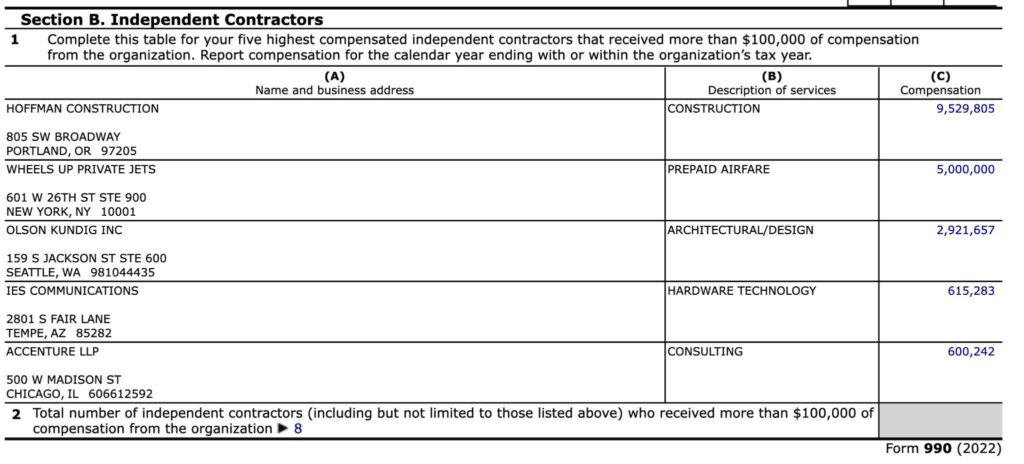The Oregon House Committee On Higher Education and Workforce Development will vote on whether or not to move forward a bill that will subject public university foundations to public records laws. House Bill 3213 is now scheduled for a work session on April 8 after the committee heard public testimony in late February. It is likely to be recommended for a vote before the end of this legislative session.
Public University foundations are largly considered private nonprofits that accept donations and manage large endowments for a university. Often the assets they control represent a significant portion of a public university’s capital investments and operating budget. Donations given to foundations regularly have donor conditions attached to these gifts and can have a significant impact on the direction of university investments and their educational priorities. In the case of public universities like the University of Oregon, wealthy donors like Phil Knight of Nike have long been known to set priorities for UO through outlandishly large donations. The details of many of these donations or the conditions attached to their expenditure are hidden from public view through the foundation.
HB 3213 expands Oregon’s sunshine laws to cover state university foundations and provides a significant level of transparency into the decision making and financing of state institutions. The bill, sponsored by Rep. Farrah Chaichi (D-Beaverton), builds on the precedent of neighboring states like California, Washington, and Nevada. Other states including Georgia, Virginia, and Tennessee have increased transparency of university foundations through public records laws. Michigan has done so while holding some of the nation’s largest endowments and has built over 25 years of case law on the matter.
During public testimony on Feb. 28 before the House Committee, both supporters and opposition addressed concerns of a chilling effect on donor contributions. Vice Chair Lisa Fragala asked if Ken Fincher, Executive Director of the Oregon Tech Foundation, could cite any research other than anecdotes concerning chilling effects on donor contributions. Though Fincher opposed the bill, he was unable to cite relevant studies on the matter.
Erica Thomas of PSUFA Local 3571 who testified in support of the bill produced a specific study on the subject titled, “A Real Home Field Advantage: Access to Public University Foundation Records” by Scott Reinardy and Charles Davis. The study asserts, “chilling effect on donations is, however, unproven at best, and at worst an assumption used to justify needless secrecy.” Thomas went on to say, “When organizations are more transparent, donors are more likely to contribute because they can see the impact of their contributions.”
Outside of university foundations opposing the bill the only other voice of dissent was the Nonprofit Association of Oregon. Their written testimony mainly focused on the bill setting a precedent that could open the door for other nonprofits such as K-12 foundations, parks foundations, and zoo foundations, to one day find themselves subject to unnecessary public scrutiny. But even the bill’s main author UO graduate student Andrew Ducharme feels that the scale these smaller nonprofits operate within just isn’t comparable to the billions controlled by Oregon’s eight state university foundations.
The situation created by foundations having control over so many university assets has often created serious difficulties at the bargaining table during labor negotiations. Many labor leaders know the foundations have substantial funds that are in a black box outside of public view. The often bemoaned “buckets argument,” whereby administrators assert funding is in different buckets and cannot be used to cover labor expenses, has gone far to erode trust and in large part given rise to this bill.
Examining the few tax records publicly available about the UO foundation, grad student Andrew Ducharme noticed $5M in compensation to Wheels Up Private Jets, a company based in New York. Any details behind this type of information are beyond public reach for now. Unlike other public records requests which can view the internal communications of public bodies, the bill might not make available direct communications if donor anonymity cannot be shielded.

Even so, HB 3212 could be a game changer for fossil fuel divestment campaigns, the Boycott Divestment Sanctions movement, and a cornucopia of ongoing and future labor negotiations. All of which have long sought to hold the financial and investment practices of state university foundations publicly accountable.
“While the foundations are considered separate entities they rely on the name, reputation, mission, and students of the public universities to raise funds,” testified Rep Chaichi.
Discover more from Solidarity News
Subscribe to get the latest posts sent to your email.
